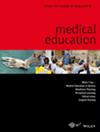Mindsets have become an important focus in the fields of social and cognitive psychology. When holding a growth mindset, people appear more likely to engage in hard work and effort to foster success, seeing setbacks as necessary for learning. When holding a fixed mindset, in contrast, people tend to believe success comes from innate ability, seeing setbacks as evidence of inability. As such, mindsets affect students' learning, resilience and personal development. There is little empirical evidence, however, regarding how medical students perceive mindsets and the fundamental determinants of mindset formation, especially in non-Western contexts. This study investigated medical students' mindsets and perceptions of mindset formation with the aim of broadening the cross-cultural understanding of self-theories.
Using a convergent mixed-methods approach at a medical school in China, the authors conducted a survey and four focus groups with medical students in first to third years. Quantitatively, we used the Dweck Mindset Scale to describe medical students' mindsets in the domains of intelligence and talent. Qualitatively, we analysed focus group data using a grounded theory approach to develop a descriptive model.
Survey results included 464 responses for quantitative analysis. Multivariable regression found that Year 3 students had more fixed mindsets for intelligence and talent (p < 0.05) compared with Year 1 students. Rural students reported a more mixed mindset for intelligence compared to urban students (p < 0.05). Qualitative analysis of focus group data yielded four major categories: beliefs about mindsets, conceptualization of mindsets, achievement motivation and source of mindset formation. We developed a Mindset Basis Model to depict connections among the factors students perceived to influence mindset formation—intra- and interindividual factors; contextual factors; and micro-, meso- and macro-system factors—and students' motivation regarding achievement.
The study describes medical students' mindsets for the domains of intelligence and talent and explores how they conceptualised these mindsets. The findings indicate that factors influencing mindsets do not operate in isolation but through intricate interactions among multilevel factors embedded within a context.


